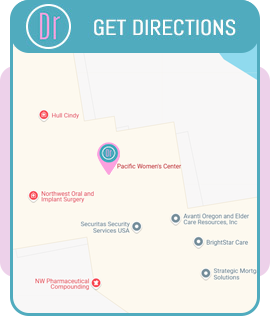Menopause Treatment Specialist in Eugene, OR
Suffering from menopause? We want to ensure your peaceful transition into menopause and will help ease your journey as much as possible. Dr. Richard Beyerlein MD, CPI, FACOG, and Tamara A. Stenshoel, MD, FACOG can help! We specialize in women’s healthcare services and can provide you with high-quality Menopause Treatment. For more information, contact us or schedule an appointment online. We are conveniently located at 911 Country Club Rd. Suite 222, Eugene, OR 97401.




Table of Contents:
When does menopause begin and how long does it last?
What are the symptoms of menopause?
Why does menopause occur?
How is menopause diagnosed?
What are the treatment options for menopause?
As our bodies mature, they go through many different changes, from infancy to advanced age. This can look very different for men and women, although the change for both genders is inevitable. Women go through many drastic changes as they mature, and menopause is often what comes to mind when thinking about these changes. Menopause is characterized by the absence of a menstrual cycle, which normally occurs between the ages of 45 to 55. During this time, the ovaries stop producing high levels of hormones, primarily estrogen and progesterone. This can cause women to experience hormone-related symptoms, such as hot flashes, emotional changes (mood swings, irritability), difficulty sleeping or dry skin. Menopause is defined by discontinuing your period for one full year.
Menopause usually lasts one to two years. Some symptoms of menopause, such as hot flashes, typically last for one to two years, but in some cases, they can continue for 10 years or longer.
Menopause typically occurs between the ages 45 and 55 in most women. In the United States, the average time menopause occurs is between the ages of 51 and 52.
The symptoms of menopause commonly include:
• Irregular periods
• Breasts feeling tender
• Periods that are shorter or longer than they were before
• Periods that are heavier or lighter than before
• Hot flashes/flushes
• Vaginal dryness
• Vaginal itching and burning
• Trouble sleeping
• Mood swings or irritability
• Forgetfulness
• Urinary incontinence
• Pain during sex
• Loss of interest in sex
Menopause can result from:
• Naturally declining reproductive hormones
• Surgery that removes the ovaries (oophorectomy)
• Chemotherapy and radiation therapy
• Primary ovarian insufficiency
In many cases, menopause can be self-diagnosed through observance of symptoms and recognition of changes in the body. However, talking with a women’s health specialist is the best way to confirm the diagnosis. They can also help identify ways to reduce bothersome symptoms, such as hot flashes, restlessness, and mood changes.
Because menopause shares some symptoms with other conditions, like ovarian failure or thyroid problems, doctors can perform tests to rule out the possibility that another condition is causing the symptoms. These may include:
• Blood tests
• Thyroid function tests
• Lipid profiles
• Tests for liver and kidney function
When diagnosing menopause, blood tests are used to check the levels of follicle stimulating hormone (FSH) and estrogen. This is because FSH levels increase during menopause, and levels of estrogen decrease.
There are many options available for the treatment of menopause, which range from lifestyle modifications to hormone therapy. Lifestyle changes to manage symptoms include:
• Hot Flashes — Drink cold water, maintain adequate levels of hydration, go to a cooler room, or take a cold shower to lower body temperature.
• Painful Intercourse — To minimize the discomfort of vaginal dryness, use water-based lubricants during intercourse
• Night Sweats and Insomnia — Avoid caffeine, smoking and alcoholic beverages as much as possible as all of these can cause hot flashes or difficulty sleeping.
• General Health — Getting plenty of sleep, eating a nutritious diet, and exercising regularly are three things that can help improve the health of any individual and can also help ameliorate menopausal symptoms.
Aside from lifestyle modifications, treatment options for menopause often include hormone therapy. Hormone therapy, or HT, helps to balance the level of hormones in the body that contribute to uncomfortable symptoms, and can greatly improve one’s quality of life. It is one of the most effective treatments for menopause, however it could cause complications if certain underlying health conditions are present.
Menopause can cause many changes in your body. The symptoms are the result of a decreased production of estrogen and progesterone in your ovaries. Symptoms may include hot flashes, weight gain, or vaginal dryness. Vaginal atrophy contributes to vagina dryness. With this, there can be inflammation and thinning of the vaginal tissues which adds to uncomfortable intercourse. Menopause can also increase your risk for certain conditions like osteoporosis.
To find out the best treatment for menopause in your situation, visit Dr. Richard Beyerlein today. Our women’s health doctor specializes in treating menopause and can help you manage your symptoms for a better quality of life. Call us today to book an appointment for menopause treatment, or visit our clinic conveniently located at 911 Country Club Rd. Suite 222, Eugene, OR 97401. Our women’s health clinic is open Monday to Friday, from 8:00 AM to 5:00 PM. We look forward to serving you! We serve patients from Eugene OR, Springfield OR, Coburg OR, Creswell OR, Cottage Grove OR, Lowell OR, and Junction City OR.

ADDITIONAL SERVICES YOU MAY NEED
❱ Abdominal Hysterectomy
❱ Bladder Lift Surgeon Q&A
❱ Cervical Cone Biopsy
❱ Colposcopy
❱ Endometrial Ablation
❱ Endometrial Biopsy
❱ Female Sexual Dysfunction
❱ Gynecological Surgery
❱ Gynecology
❱ Hormone Therapy
❱ Vaginal Hysterectomy
❱ Endometriosis Diagnosis & Care



